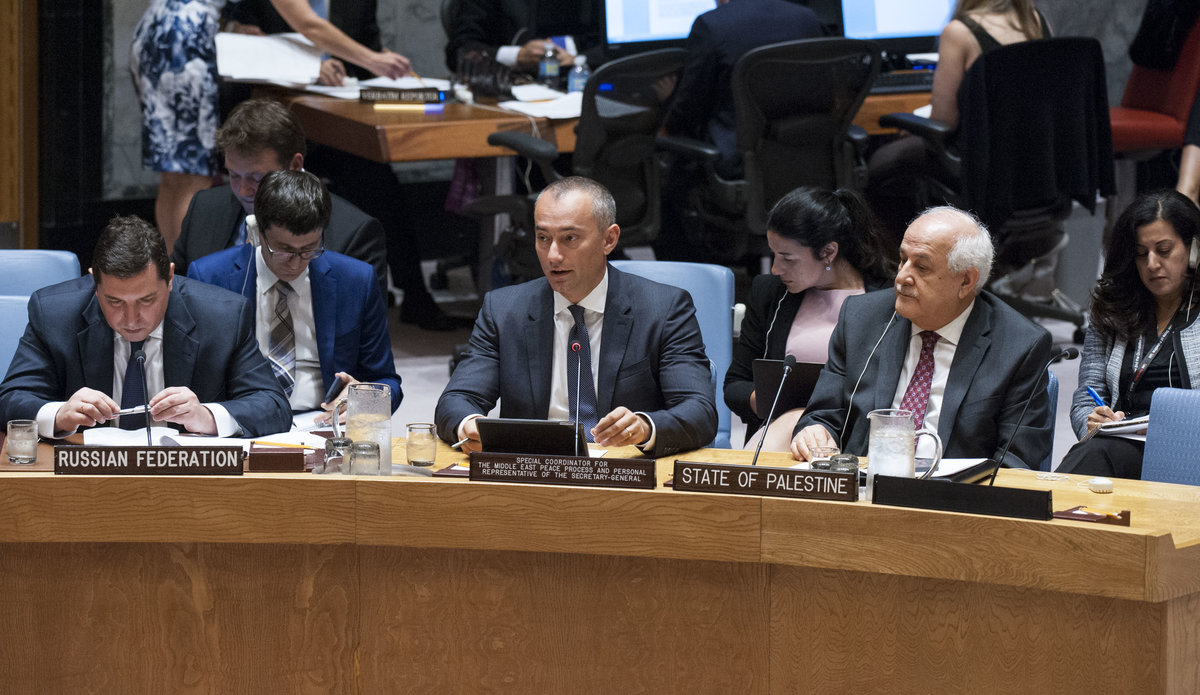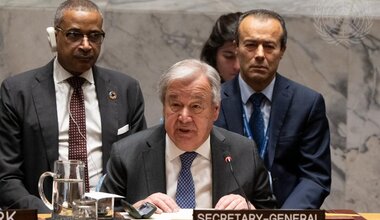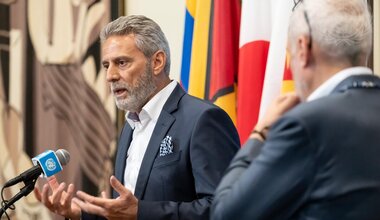Security Council Briefing on Situation in the Middle East, including the Palestinian Question
Mr. President,
Members of the Security Council,
As we meet today to discuss the situation in the Middle East, including the Palestinian question, the risks of escalation and violence in the region continue to increase, despite the emergence of a newfound agreement among a number of countries of the need to stand united against terrorism and radicalism.
As societies continue to fracture along ethnic or religious lines and non-state actors continue to control large territories, recent events in Jerusalem resonate across the Middle East.
For nearly a century, despite a myriad of peace efforts, one conflict has evaded solution. Some say it is irresolvable. Others challenge the basic premise of international consensus on how it can be resolved.
The Palestinian - Israeli conflict is not only about land and peace. It is about two peoples who both have legitimate national aspirations for statehood and recognition. Two nations, whose histories are intertwined, and whose future is forever intricately linked.
Mr. President,
Fortunately until now, Israelis and Palestinians have not succumbed to the torrent of violent upheaval that has engulfed the region in recent years. But half a century of occupation has produced tens of thousands of casualties and left deep psychological scars on both sides.
Developments over the past 11 days at the holy sites of the Old City in Jerusalem, however, have demonstrated the grave risk of dangerous escalation that exists, a risk of turning the Israeli-Palestinian conflict into a religious conflict and dragging both sides into the vortex of violence with the rest of the region.
On July 14, two Israeli policemen were killed by three assailants at the Lion’s Gate entrance of the Holy Esplanade. The attackers fled inside the compound before being shot by police. According to the Israeli authorities the assailants had initiated the attack from within the compound.
In the immediate aftermath, the Palestinian President condemned the attack, while the Israeli Prime Minister committed to upholding and respecting the status quo at the holy sites in the Old City of Jerusalem.
Citing security concerns, the Israeli authorities closed the compound to all, including, for the first time since 1969, to Muslims for Friday prayers, and restricted entrance to the Old City in order to secure the area of the attack, search for further threats and conduct an investigation.
Two days later, on Sunday 16th of July, the compound was reopened, first for Muslim worshippers, and later for visitors, placing metal detectors outside of its entrances.
The Islamic Waqf immediately rejected this move as a change in the status quo and called on worshippers not to enter the compound through the metal detectors but to pray outside the entrance and in the streets of Jerusalem. Palestinian factions also immediately rejected these measures. Hamas and Islamic Jihad issued a joint statement warning that this is a red line that would lead to an escalation and Fatah called for “a day of rage”.
Starting on 16th of July, prayers and peaceful protests were conducted at Lion’s Gate, followed by clashes with the Israeli police. Tensions rose by Friday the 21st of July, as the Waqf announced the closure of all Jerusalem mosques for Friday prayer. In response, Israel announced a restriction of entry for all Muslim men under 50 into the Old City. Clashes that evening and the next day turned fatal, with four Palestinian protesters killed and hundreds injured.
Later on Friday, three Israelis were killed in a brutal terror attack at their home in the settlement of Halamish by a 19-year-old Palestinian assailant who in his last will made a clear connection between his act and the events in East Jerusalem.
Overall in clashes since the 14th of July, at least four Palestinians have been killed and over 300 injured.
I ask member states today to unequivocally condemn the violence of the last few days. Our thoughts and prayers must go out to the victims and all their families.
On 21 July, President Abbas announced that the Palestinian Authority was freezing all contact with Israel, including high-level security coordination – a decision that has the potential to further destabilize the situation.
Let us make no mistake that while events in Jerusalem may be taking place over a couple of hundred square meters in the Old City; they affect hundreds of millions of people around the world.
Therefore, I welcome last night’s decision by the Israeli security cabinet to remove the metal detectors. I hope that the cabinet decision will lead to a calming of the current tensions and will enable a return of worshippers to the Holy Esplanade. It is expected that President Abbas will convene the Palestinian leadership later tonight to discuss these developments.
Mr. President,
As we have seen over these past 11 days, it is vital that the status quo in Jerusalem, established since 1967, be preserved while security be maintained for worshippers and visitors to the holy sites. I encourage Israel to continue its intense contacts with Jordan, recognizing the special and historic role of the Hashemite Kingdom.
All parties must refrain from provocative action, show restraint, and bring a conclusive end to this crisis in the next few days. In these efforts, constant discussion with the Islamic religious authorities in Jerusalem and the Palestinian leadership can greatly contribute to maintaining calm in East Jerusalem and the rest of the occupied West Bank.
As this crisis has unfolded I want to reflect briefly on the views that we hear from residents in East Jerusalem, people who have been in the forefront of events in the past two weeks. They often tell us that for many years they have felt that their religious and ethnic identity is under threat; that their very livelihood in their own city is at risk while living under occupation; their children often live in fear of security operations and house demolitions. They want to pray in peace and live in security and freedom. Many of them feel alone. They talk of the ‘special status’ that United Nations Resolution 181 (in 1947) had bestowed on Jerusalem, yet they see the reality around them. This is why often they come to us, the United Nations, appealing for protection. It is critical that any decision made at the highest political and religious levels, if it is to be sustainable, take into consideration the fears and hopes of people on the ground.
Jerusalem remains a final status issue that needs to be decided and negotiated between the two sides.
As the occupying power, Israel has a responsibility to uphold its obligations under International Human Rights Law and Humanitarian Law, and must show maximum restraint in order to avoid further loss of life and an escalation of the situation.
At the same time, Palestinian leaders have a responsibility to avoid provocative statements that further aggravate an already tense environment. I am particularly concerned in this respect by statements made in the past weeks by some factions that have sought to fan the flames of violence. Such provocations are dangerous and I call on all to condemn them.
This crisis has diverted us from the real tasks ahead, namely how to restore a political process in order to find a solution that meets the legitimate aspirations of both Israelis and Palestinians; a solution that is based on United Nations Resolutions and is achieved through negotiations; a solution whose ultimate goal is two states living side by side in peace and security.
Mr. President,
Unfortunately, these latest incidents have taken place against a backdrop of other developments in the Israeli - Palestinian conflict.
In July alone, plans were advanced for over 2,300 housing units in East Jerusalem – 30 per cent more than were advanced during all of 2016. This includes plans for some 1,600 units expanding a ring of settlements north of East Jerusalem, as well as plans in Sheikh Jarrah, which may involve demolition of Palestinian houses.
I must once again emphasize that settlement activity in occupied territory is illegal under international law, and undermines the chances for the establishment of a viable, contiguous, and sovereign Palestinian state.
Mr. President,
On a positive note, some constructive steps have been taken that are in line with the recommendations of the Middle East Quartet’s report.
On 10 July, an interim power purchasing agreement was signed between Israelis and Palestinians, energizing the first Palestinian-owned and operated substation in Jenin. This will increase electricity supply in the northern West Bank and help the Palestinian Authority take control of the energy sector. Both sides should now move to negotiate a comprehensive Israeli-Palestinian power purchasing agreement that would be a landmark achievement towards the energy independence of Palestine.
On July 13th, with United States facilitation, the Palestinian Authority and Israeli Government also reached an agreement for an increase in water supply for Palestinians in the West Bank and Gaza. Under its terms, the Palestinian Authority will purchase some 32 million cubic meters of water from Israel, 22 million cubic meters for the West Bank and 10 for Gaza. The water will come from a desalination plant to be constructed in Aqaba, Jordan.
The implementation of such agreements is instrumental in rebuilding trust between Palestinians and Israelis. They are, however all put at risk by the freezing of contacts between the Palestinian Authority and Israel. Without resolution to the current crisis, these hard won gains will swiftly evaporate.
Mr. President,
I now turn to the situation in Gaza with a very heavy heart. Two million people have been taken hostage in the political standoff between Fatah and Hamas.
The humanitarian impact of the punishing measures taken against Gaza is appalling.
In some parts of Gaza people have experienced electricity cuts of 36 hours.
No electricity means no drinking water.
Hospitals are struggling to survive.
An environmental crisis is in the making.
Whatever the political differences between the Palestinian factions, it is not the people of Gaza who should be paying the price.
I want to assure you Mr. President, that the UN will not give up on Gaza and its people. Despite the odds, we will continue our intense mediation efforts to resolve the standoff.
I want to thank Egypt for stepping in at a moment of need and facilitating the entry of badly needed fuel to increase electricity supply. Egyptian fuel, along with the nearly 900 thousand liters of fuel per month provided by the United Nations for the most essential services, provide a temporary lifeline to the residents of Gaza.
In this environment, the continued functioning of the Gaza Reconstruction Mechanism is more than ever critical for the people of Gaza. Recently, too, Qatar has signed contracts for eight more residential buildings as part of their commitment to reconstruction.
Mr. President,
Today Gaza and the West Bank are further apart than ever. Palestinian leaders must make some hard choices about the future of their people.
They can work to overcome their ideological divisions, or they can continue along the path that will guarantee Gaza’s complete collapse.
They can work to unite Palestinians in pursuit of the goal of statehood, or they can oversee the demise of the Palestinian national project.
They can resolve the current crisis in Gaza, or preside over the radicalization of their population and see it fall into the hands of extremists with even more destructive agendas.
I know that this is not the future that President Abbas or the majority of Palestinians want for their country. I know that they want to build a state in which human rights are respected; a state that is achieved on the basis of negotiations — not violence; one that lives in peace and security with the State of Israel.
For ten years, however, the population in Gaza has lived in a state of chronic vulnerability.
At what point will people say enough is enough?
At what point will we say enough is enough?
Since violently seizing control of Gaza, Hamas has tightened its grip on power and suppressed dissent.
The fact that no presidential or legislative elections have been held in Palestine since 2006 has also created a democratic deficit that undermines the legitimacy of institutions.
Two different legal systems have emerged and diverging laws have been enacted in Gaza and the West Bank.
I once again call on all Palestinian leaders to address the destructive consequences of the split. I encourage them to reach agreement that would allow the legitimate Palestinian government to take up their responsibilities in Gaza, as a step towards the formation of a national unity government on the basis of the PLO platform, and agree to hold elections.
Meanwhile Hamas must ensure that calm is maintained by ceasing militant buildup against Israel and by maintaining security at the border of Egypt.
At the same time, I encourage Israel to step-up its measures to lift the closures and facilitate development in Gaza as overall calm persists in the Strip; and this should be done in line with Security Council resolution 1860.
Mr. President,
Turning to Lebanon, I refer to the briefing by the Special Coordinator for Lebanon a few days ago who briefed the Council in detail on developments and risks under UN Security Council Resolution 1701.
Meanwhile I also want to note the ceasefire between Israel and the Syrian Arab Republic has been maintained. I am alarmed by the recent spike of military activities in Syria, which has resulted in several spillover fire incidents across the Disengagement Line and Israeli retaliatory actions.
I join the Secretary-General in welcoming the announcement by the Governments of Jordan, the Russian Federation and the United States of a de-escalation zone and arrangements to support a ceasefire and delivery of humanitarian assistance in southwest Syria.
Mr. President,
In closing, let me emphasise that the events that we have witnessed over the past weeks in Jerusalem are a reminder of how easy it is to reach the precipice of a dangerous escalation in Israel and the occupied Palestinian territory. We are not over this crisis yet. I hope that the steps being taken by Israel will enable a return to relative calm, and we all hope this will happen in the next days, with agreement between Israel and Jordan and the positive engagement of the religious authorities, to avoid a cycle of violence that would destroy all peace efforts for the foreseeable future.
We must not lose focus on the need to restore a political perspective, on the need to bring Palestinians and Israelis back into an environment that is conducive to negotiations on final status arrangements and avoids turning the national Israeli-Palestinian conflict into a religious one.
Thank you.
 UN
UN





